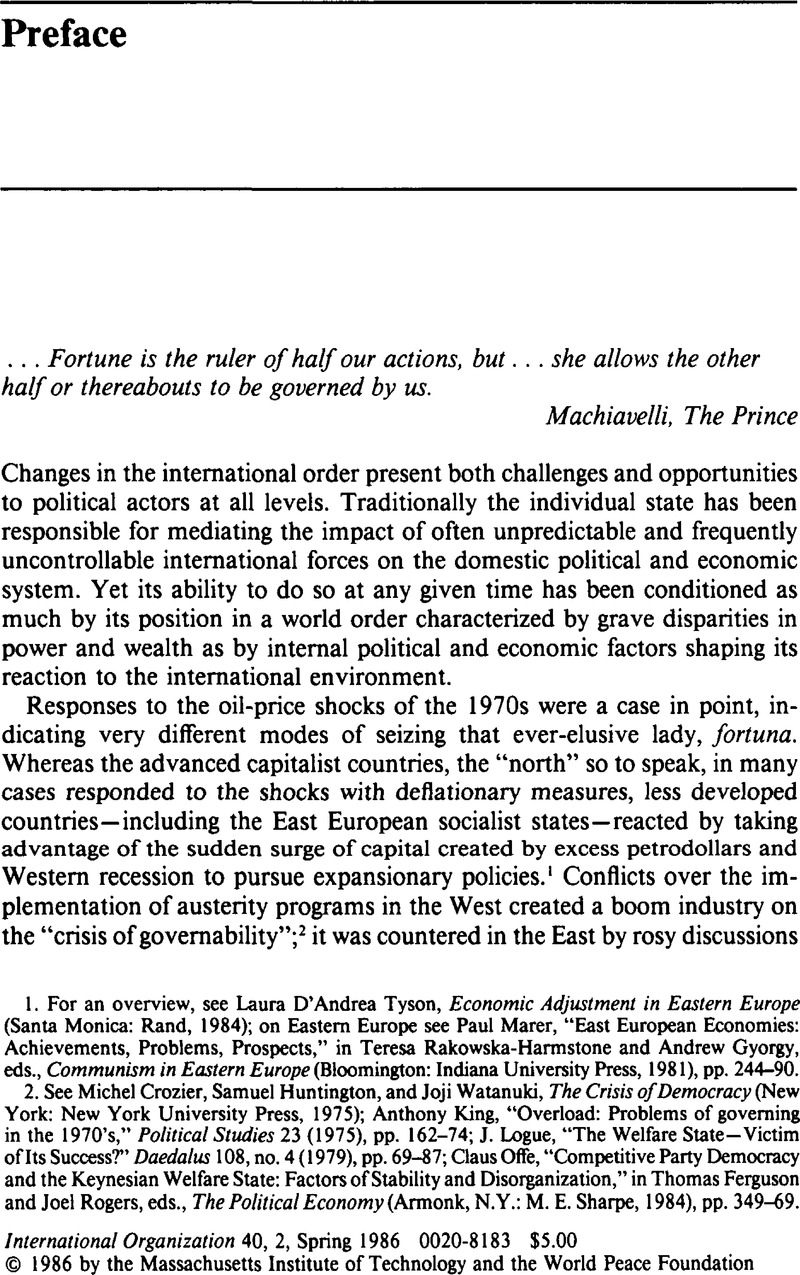Article contents
Abstract

- Type
- Preface
- Information
- Copyright
- Copyright © The IO Foundation 1986
References
1. For an overview, see Tyson, Laura D'Andrea, Economic Adjustment in Eastern Europe (Santa Monica: Rand, 1984)Google Scholar; on Eastern Europe see Marer, Paul, “East European Economies: Achievements, Problems, Prospects,” in Rakowska-Harmstone, Teresa and Gyorgy, Andrew, eds., Communism in Eastern Europe (Bloomington: Indiana University Press, 1981), pp. 244–90Google Scholar.
2. See Crozier, Michel, Huntington, Samuel, and Watanuki, Joji, The Crisis of Democracy (New York: New York University Press, 1975)Google Scholar; King, Anthony, “Overload: Problems of governing in the 1970's,” Political Studies 23 (1975), pp. 162–74Google Scholar; Logue, J., “The Welfare State—Victim of Its Success?’ Daedalus 108, no. 4 (1979), pp. 69–87Google Scholar; Offe, Claus, “Competitive Party Democracy and the Keynesian Welfare State: Factors of Stability and Disorganization,” in Ferguson, Thomas and Rogers, Joel, eds., The Political Economy (Armonk, N.Y.: M. E. Sharpe, 1984), pp. 349–69Google Scholar. Essays in Hirsch, Fred and Thorpe, John Gold, The Political Economy of Inflation (Cambridge: Harvard University Press, 1978)Google Scholar, and Berger, Suzanne, ed., Organizing Interests in Western Europe (New York: Cambridge University Press, 1981)Google Scholar, are also preoccupied with the theme of “governability.”
3. See Biró, József, “Hungarian Foreign Trade in the Seventies,” in Simon, Denis, ed., Modern Hungary (Bloomington: University of Indiana Press, 1973), pp. 164–85Google ScholarPubMed.
4. For example, see Evans, Peter, Dependent Development: The Alliance of Multinational State and Local Capital in Brazil (Princeton: Princeton University Press, 1979)Google Scholar; Grunwald, Joseph, ed., Latin America and the World Economy (Beverly Hills: Sage, 1978)Google Scholar; McMillion, Charles W., “International Integration and Intra-national Disintegration: The Case of Spain,” Comparative Politics 13 (04 1981), pp. 291–313Google Scholar; Fields, G. S., “Who Benefits from Economic Development? —A Reexamination of Brazilian Growth in the 1960s,” American Economic Review 67 (09 1977), pp. 570–82Google Scholar; Chinn, D. L., “Distributional Equality and Economic Growth: The Case of Taiwan,” Economic Development and Cultural Change 26 (10 1977), pp. 65–79Google Scholar; Cumings, Bruce, “The Northeast Asian Political Economy,” International Organization 38 (Winter 1984), pp. 1–41Google Scholar.
5. See Katzenstein, Peter, Between Power and Plenty: Foreign Economic Policies of Advanced Industrial States (Madison: University of Wisconsin Press, 1978)Google Scholar; Katzenstein, , “Introduction: Domestic and International Forces and Strategies of Foreign Economic Policy,” and his “Conclusion: Domestic Structures and Strategies of Foreign Policy,” International Organization 31 (Autumn 1977), pp. 587–607, 879–920Google Scholar.
6. Gourevitch, Peter suggests such possibilities in “The Second Image Reversed: The International Sources of Domestic Politics,” International Organization 32 (Autumn 1978), pp. 881–913Google Scholar, and in Hirschman, Albert, “Beyond Asymmetry: Critical Notes on Myself as a Young Man and on Some Other Old Friends,” International Organization 32 (Winter 1978), pp. 45–51Google Scholar.
7. Machiavelli, Niccolo, The Prince and the Discourses (New York: Random, 1950), p. 92Google Scholar.
- 2
- Cited by




